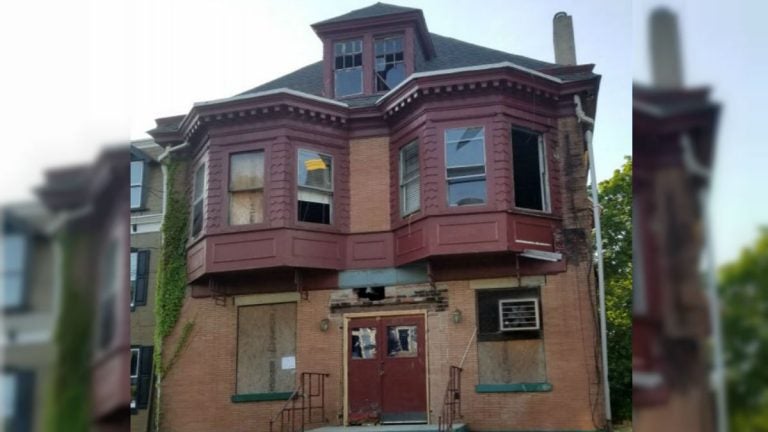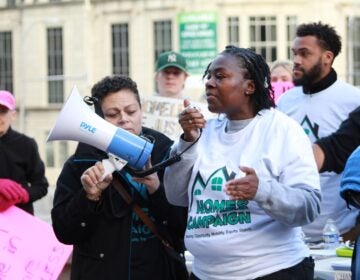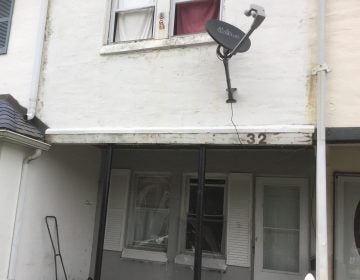Wilmington landlords, residents disagree over proposed housing code
A new housing code proposed by the city aims to hold slumlords accountable to clean up dilapidated and vacant homes.

The City of Wilmington wants to change its housing code in an effort to clean up dilapidated and vacant homes. This house is on the 2300 block of N. Market St. (Courtesy of the City of Wilmington)
A new housing code proposed by the city of Wilmington aims to hold slumlords accountable to clean up dilapidated and vacant homes.
Residents embracing the measure say they’re tired of seeing rundown properties in their neighborhoods. But some landlords say fee hikes imposed by the code will create unnecessary burdens.
Mayor Mike Purzycki touted the measure to a group of residents and landlords during a community meeting Monday night.
“The thing that has been so troubling to us is the condition of our neighborhoods, and to me the first thing we have to worry about is how do we uplift our neighborhoods,” Purzycki proclaimed at the meeting in the Northwest Wilmington neighborhood.
“This very area is such a prime example of beautiful streets with little cancers right nearby. The perfect metaphor is cancer, because it grows. Because the only people who live next to blight are people who don’t care,” he said.
Purzycki and others argue the problem is out of control: There are 1,100 rental units under inspection in Wilmington, and with only 18 Licenses and Inspections officers, the city is overwhelmed.
The mayor argues that the current code is flawed because it could be several months by the time the inspection process is complete and a case is heard in Justice of the Peace Court.
“Meanwhile, that canker sore is looking at you every single day because we can’t do anything about it because we have to wait for a judge’s order,” he said.
If passed by the City Council, the new measure would move housing violations away from the criminal system and into a civil system, shortening the duration a case awaits judgment and allowing the city to take a property to sheriff sale.
Instead of the current criminal summonses and fines, the proposed code change would impose $250 civil penalties on owners of vacant and rental properties that aren’t up to code. The new code also would increase rental inspections.
“We don’t want any money. We don’t collect enough of the fines we issue today. We’re trying to get people to fix their properties. That’s the only reason we’re doing this,” Purzycki said.
“When I look at our city, it seems to me if we don’t aggressively take on rundown properties owned by poor landlords, we’re not getting our city back. We believe if we don’t change the way we do business, we won’t be able to save half of our neighborhoods.”
But some landlords say the change is not the way to go, as it also creates higher landlord fees across the board.
The proposal imposes an annual rental business license fee of $100 per unit, instead of the current flat fee of $50 for one or two units, $120 for three units or more. Some at Monday’s meeting called the fees, which will help fund the new system, “Draconian” and say they’re a hidden tax.
Purzycki argued that a landlord with dozens of properties throughout Wilmington should be able to afford the proposed amount.
But landlords like Jeff Sheraton, who rents properties throughout the city of Wilmington as well as other parts of New Castle County, argued it would be a financial burden.
“It’s a 900% increase — so it’s $9,000 a year,” he said following the community meeting.
“We have already made adjustments. It’s not fun to do business in the city and we don’t value city properties as much as we value properties in other locations and this is just going to forward our lack of interest in investing in the city. We’ve already told our tenants on average they’re going up $25 a unit if it was to pass. No one wants to have their rent increased just like landlords don’t want their prices increased.”
Wilmington residents in favor of the measure, however, believe the proposal is the right way to go. Bill Majett said he wants his city to prosper, and believes the measure will hold slumlords accountable.
“I have nothing against rental properties. I had to rent at one time. But there’s a responsibility, I think, for all people who live in a property. You should be keeping that property up and maintaining that property, and so many people aren’t doing that. And where does the ultimate responsibly lie? It’s with the landlord. If their tenants aren’t complying it’s the landlord’s responsibility to make it happen,” he said.
“If you’re an owner and you’re trying to keep your property up, cutting your grass, planting flowers, and your next door property, or property across the street, is not being maintained, it takes the value down on the whole neighborhood,” Majett said. “Not just money-wise. There are quality-of-life issues. You want to live in an area that looks bright and clean. Your grandkids growing up, it makes it better for them, they don’t want to see trash all over the place. That helps them so when they own property, they will have a good example of how to live.”
Purzycki is holding community meetings this summer in hopes of building support for the changes ahead of a City Council vote that’s expected in September.
WHYY is your source for fact-based, in-depth journalism and information. As a nonprofit organization, we rely on financial support from readers like you. Please give today.





